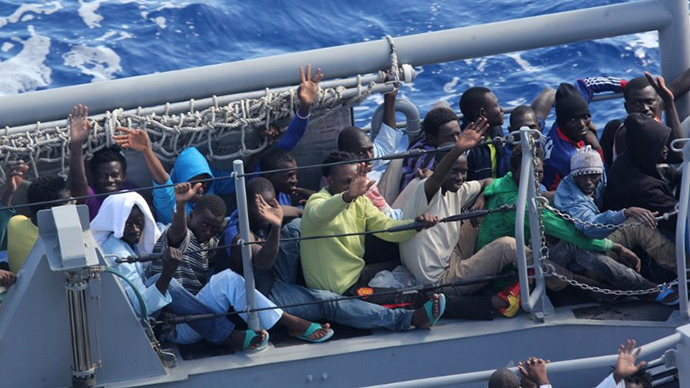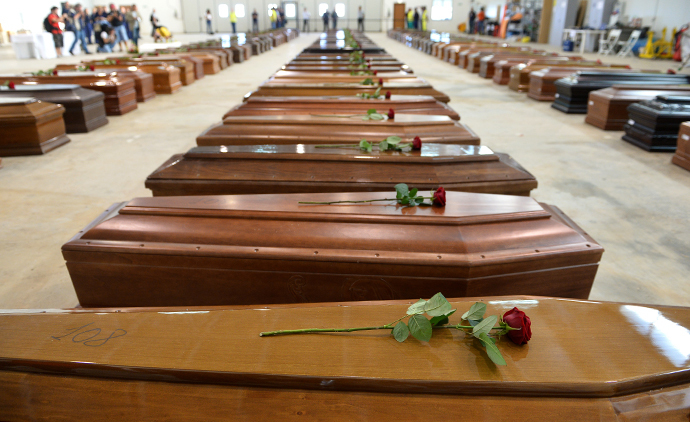Italy urges EU to share burden of migrant crisis
Italy demands an urgent shakeup of Europe's asylum policies, as it bears the brunt of a large-scale inflow of illegal migrants from the Middle East and Africa. A leaked draft EU summit statement, however, promises no radical steps until June next year.
Aseter, a young Ethiopian in Sicily, says she is lucky. She was
on a refugee boat heading from Africa to Italy the same day
another boat like hers capsized in the Mediterranean, killing
more than 300 asylum-seekers.
She is now prepared to put her luck to test once again, by
illegally crossing EU borders together with her two companions.
She is not new to taking risks, as she had to first go by foot
from Ethiopia to Sudan, then travel to Libya to finally take the
most nerve-racking boat ride of her life.
“In Sicily we managed to avoid getting registered. It's
illegal but we need to go further north - there's nothing here
for us,” Aseter tells RT correspondent Egor Piskunov, while
she hides her face from the camera.
Under EU regulation all newcomers must seek asylum in the country
where they arrive. And under Italian law anyone avoiding
registration is sent home.

That does not prevent newcomers from taking their chances of
trying to stay unregistered until reaching an EU country with
what seems to them better opportunities. Shiferaw Genene,
President of Italian Association of the Ethiopian Community
believes it’s only natural.
“When you arrive here [in Italy] they give you the very
minimum,” Genene told RT. “There’s no jobs, no school and
you sleep in the street for six months. Italy is one of the worst
European states in this regard.”
Italy and Greece are the most affected by the influx of refugees
fleeing conflicts in the Middle East and North Africa. And that
puts huge pressure on their economies, already burdened by
recession.
European Commission President Jose Manuel Barroso earlier
acknowledged that Italy and Greece bear the brunt of the
immigrants’ arrivals. He nevertheless pointed at the fact that
most of the asylum seekers – 72 percent in 2012 - are eventually
sent to better-off northern European countries like Germany,
France, Britain, Sweden and Belgium.
Still, the number of the refugees has been increasing
concurrently with the rise of anti-immigration parties all over
Europe, putting the now much-needed extension of asylum
protection to question.
Italy’s Prime Minister Enrico Letta called for an overhaul of the
European migration policy, speaking ahead of the EU leaders’
summit in Brussels, scheduled for October 24-25.
"The discussion on Thursday and Friday will be decisive for
getting this on the right track and we won't accept lowest common
denominator compromises in Brussels," Letta said as cited by
Reuters.
But that seems to be exactly, what’s going to be offered at the
summit, according to its draft statement obtained by AFP, which
will postpone long term decisions to a summit in June next year.
Meanwhile the migrants issue gets ever more pressing with 550
asylum seekers having drowned this month alone in the
Mediterranean.

"No one should be under any illusion that these tragedies are
passing episodes or that they will end with the arrival of bad
weather," Letta warned.
The EU promised Italy would receive an additional 30 million euro
($40 million) to deal with the refugee crisis.
But what Italy and Greece would also like to see are new
mechanisms to distribute the migrants more evenly throughout the
Union and integrate them into the economy.
Another problem Italy urges the EU to solve as soon as possible
is the underfunded Frontex border agency. It reportedly saved
16,000 lives in the Mediterranean in the last two years, but its
budget was cut by almost a third since 2011. Italy would also
like to see the launch of Eurosur, a new program to share
satellite and drone surveillance data, sped up. Eurosur could
help detect the rickety boats heading to European shores before a
tragedy happens.
More than 32,000 migrants have arrived in Italy and Malta from
Africa and the Middle East this year, according to the United
Nations High Commissioner for Refugees.
Eurostat data suggests the number of asylum applications in Italy
has increased by more than 100 percent compared to last year. And
Greece is second only to Germany when it comes to the highest
number of pending applications.
Phillip Claeys, an MEP for the Belgian Nationalist Party, believes that the only way to solve the problem of illegal migrants risking their lives to come Europe is dramatically change how we deal with asylum seekers.
“When we have a European Union with no internal borders anymore, it’s in the interest of all the other member states to see to it that the external borders are being controlled," he told RT.
“We should adopt stricter policies because one of the main reasons why so many people are risking their own lives trying to cross the Mediterranean is that even when they don’t qualify as refugees, most of them can still be in Europe as illegal immigrants as they are not sent back to their countries of origin,” he added.
He also said that the EU should use any technology available to it, to track migrants on their journey as it would help to save lives and would act as a further deterrent.
“Every technological possibility should be used to control our borders, to combat illegal immigration and at the same time would also help to save lives because we can see at an early stage that people are trying to cross in boats that are not seaworthy, we could have an alert,” he said.














